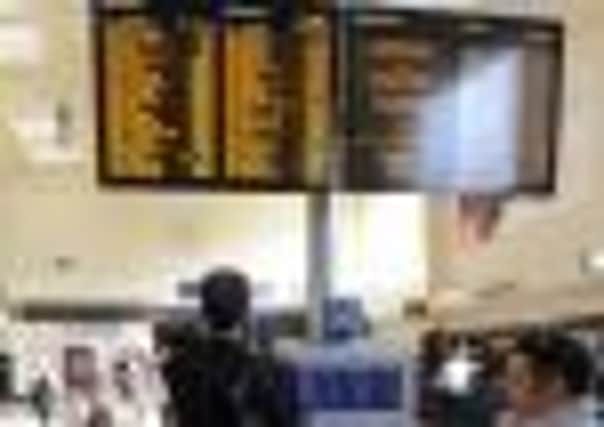Kieran Preston: We should put North’s rail services in the hands of the people close to them


As well as West Yorkshire, the network covers Merseyside, Greater Manchester Tyneside, South Yorkshire, Teesside Humberside, plus large areas of Derbyshire North Yorkshire, Cumbria, Northumberland, Nottinghamshire and Lancashire.
Yet most of the key decisions on those franchises, determining when, where and how trains should be run, are made by civil servants based in London, and are made with very little local knowledge.
Advertisement
Hide AdAdvertisement
Hide AdAlong with the North’s other Passenger Transport Executives (PTEs) and intervening authorities such as York City Council and North Yorkshire County Council, Metro believes the North’s railways need to be sustainable, of a higher quality, and better able to grow in order to meet the region’s needs and economic priorities.
It is with this aim that we are holding discussion with the Department for Transport (DfT) on how those Northern and TransPennine franchises could be devolved to our control.
Metro and the other PTEs already have a statutory role in financing rail services. Metro itself spends more than £70m annually supporting 25 million journeys on West Yorkshire train services.
We are certain that we can use our overall transport role, our wealth of local knowledge and industry experience to introduce measures that would add value to the North’s rail network, such as ensuring bus and train services were co-ordinated.
Advertisement
Hide AdAdvertisement
Hide AdTo achieve this wholesale improvement and attract the additional investment required, we want to see the control and funding available of a 15-year northern rail franchise devolved to a “Northern Rail Executive” working to a strategic delivery plan.
The overall franchise area would be divided into business units, aligned to metropolitan PTE areas, which would take responsibility for a set of rail services with appropriate funding while ensuring political accountability at all levels. Non PTE areas covered by the new franchise could retain their current role or become more proactive with a greater voice.
Under the proposed arrangement, the Government would pay the northern rail subsidy to the rail executive, which would then pay it to the franchisee train operator.
By having northern PTEs as strongly motivated clients for railway companies keen to implement many of the efficiencies recommended in the recent McNulty review of the rail industry, the Government would benefit from better value for money from its significant subsidy.
Advertisement
Hide AdAdvertisement
Hide AdIt would also see spending on rail better integrated with other major spending programmes and a rail policy more aligned to wider strategic agendas relating to localism, economic growth and cities. We are using current levels of subsidy as the starting point, and assume that both Government and the new Northern Rail Executive would, over time, reduce subsidy to the franchisee as efficiency savings are realised.
With the provision of train capacity to deal with current overcrowding and meet forecast growth representing one of our main challenges, funding for renewals and replacement of life-expired trains and carriages should be included.
There are 400 trains across the North that are more than 30 years old. We need to make train travel becomes a more attractive proposition to those put off by having to stand for their journeys on those 30-year-old vehicles.
The longer, 15-year franchise would give us the opportunity to address these issues shaping services to meet local needs and targeting funds where they would have most impact. Attracting new investment would enable us to work with partners such as rolling stock companies and Network Rail.
Advertisement
Hide AdAdvertisement
Hide AdRisk could be shared with the franchisee, and money borrowed to invest for local use to introduce new carriages and carry out infrastructure improvements such as the further electrification of routes such as the Calderdale line between Bradford, Halifax and Manchester and the Leeds, Harrogate and York line.
This work, which is very much in line with the aims of the Leeds City Region Local Enterprise Partnership (LEP), is not about creating a new Whitehall for the North.
It is vital that there is understanding between all affected authorities that the rail executive is the way forward.
There has to be open and transparent discussion on the roles each authority will take, their responsibilities and the risks involved. Metro’s view is that it will open up opportunities for dialogue between great cities such as Leeds and Manchester on how by working in partnership, they can maximise the mutual benefits of developing the North’s rail network.
Advertisement
Hide AdAdvertisement
Hide AdWith many years’ experience of collaborating across city, district, county and regional boundaries, and working with the DfT and the transport industry, the PTEs are ideally placed to make this agreement work.
Our aim is to develop dynamic bodies using local expertise to shape services at metropolitan levels while at the same time cooperating and collaborating on region-wide issues including future developments such as the arrival of high- speed rail.
It is not a done deal, discussions with the DfT are ongoing, and without the “dowry” of the subsidy payment the plan will never leave the platform.
However, we are confident that Department officials and Ministers, keen to achieve the best value for money for their spending, will realise that the destiny of the North’s railways is best placed in the hands of those who understand it and are passionate about it.
Kieran Preston is director general of Metro, the West Yorkshire Passenger Transport Executive.